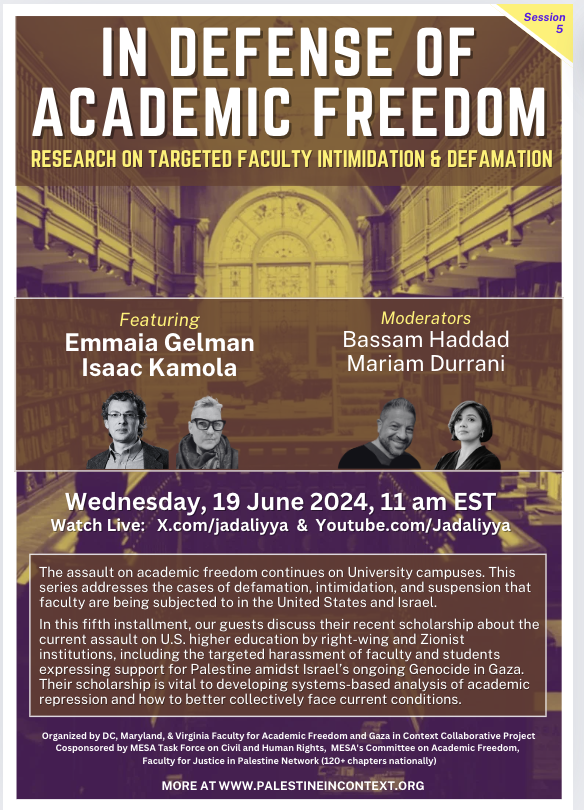In Defense of Academic Freedom:
Defamation, Intimidation, and Suspension
Featuring:
Emmaia Gelman
Isaac Kamola
Moderators:
Bassam Haddad
Mariam Durrani
Organized by DC, Maryland, and Virginia Faculty for Academic Freedom; Cosponsored by MESA Task Force on Civil and Human Rights, Gaza in Context Collaborative Project, and Faculty for Justice in Palestine Network (115+ chapters nationally)
Wednesday, 19 June 2024
11:00 AM EST
In this fifth installment, our guests discuss their recent scholarship about the current assault on U.S. higher education by right-wing and Zionist institutions, including the targeted harassment of faculty and students expressing support for Palestine amidst Israel's ongoing Genocide in Gaza.Their scholarship is vital to developing systems-based analysis of academic repression and how to better collectively face current conditions.
In Defense of Academic Freedom
The assault on academic freedom is growing on University campuses. We are launching this series to address the cases of defamation, intimidation, and suspension that faculty are being subjected to in the United States and beyond. This series aims to raise awareness of the conditions and pretenses under which such violations occur and provide resources to contend with them, not least in support of the most vulnerable targets.
This event is Co-Sponsored by the Gaza in Context Collaborative Project
Co-Organizers: Arab Studies Institute, Georgetown University’s Center for Contemporary Arab Studies, George Mason University’s Middle East and Islamic Studies Program, Rutgers Center for Middle Eastern Studies, Birzeit University Museum, Harvard’s Center for Middle Eastern Studies, Brown University’s Center for Middle East Studies, University of Chicago’s Center for Contemporary Theory, Brown University’s New Directions in Palestinian Studies, Georgetown University’s Center for Muslim-Christian Understanding, Simon Fraser University’s Centre for Comparative Muslim Studies, Georgetown University-Qatar, American University of Cairo’s Alternative Policy Studies, Middle East Studies Association’s Global Academy, University of Chicago’s Center for Middle Eastern Studies, CUNY’s Middle East and Middle Eastern American Center, University of Illinois Chicago’s Arab american cultural Center, George Mason University’s AbuSulayman’s Center for Global Islamic Studies, University of Illinois Chicago’s Critical Middle East Studies Working Group, George Washington University’s Institute for Middle East Studies, Columbia University’s Center for Palestine Studies, New York University’s Hagop Kevorkian Center for Near Eastern Studies

Featuring
Emmaia Gelman is the founding Director of the Institute for the Critical Study of Zionism, which examines the political and ideological work of Zionist institutions beyond their direct advocacy for Israel. She is a longtime activist in New York City on Palestine, policing, antiracism, and queer issues, and earned her PhD in NYU’s American Studies program in 2021. She has taught at NYU and Sarah Lawrence College. Her research looks into the history of ideas about race, queerness, safety, and rights, and their production as political levers in the realm of hate crimes policy, surveillance, anti-terror measures, and war. Emmaia is at work on a critical history of the Anti-Defamation League (1913-1990) as a Cold War neoconservative institution, and is co-editing a collection of writings on the ADL's intrusions into popular movements. She is the co-chair of the American Studies Association Caucus on Academic and Community Activism.
Isaac Kamola researches the threats of political and donor influence on academic freedom and university autonomy. He is author of the white paper “Manufacturing Backlash: Right-Wing Think Tanks and the Legislative Attack on Higher Education, 2021–2023” (2024), Free Speech and Koch Money: Manufacturing a Campus Culture War (with Ralph Wilson, 2021) and Making the World Global: US Universities and the Production of the Global Imaginary (2019). He created Faculty First Responders, a program that monitors right-wing attacks on academics and provides resources to help faculty members and administrators respond to manufactured outrage.
Bassam Haddad is Director of the Middle East and Islamic Studies Program and Associate Professor at the Schar School of Policy and Government at George Mason University. He is the author of Business Networks in Syria: The Political Economy of Authoritarian Resilience (Stanford University Press, 2011) and co-editor of A Critical Political Economy of the Middle East (Stanford University Press, 2021). Bassam is Co-Founder/Editor of Jadaliyya Ezine and Executive Director of the Arab Studies Institute. He serves as Founding Editor of the Arab Studies Journal and the Knowledge Production Project. He is co-producer/director of the award-winning documentary film, About Baghdad, and director of the acclaimed series Arabs and Terrorism. Bassam is Executive Producer of Status Podcast Channel and Director of the Middle East Studies Pedagogy Initiative (MESPI). He received MESA's Jere L. Bacharach Service Award in 2017 for his service to the profession. Currently, Bassam is working on his second Syria book titled Understanding The Syrian Tragedy: Regime, Opposition, Outsiders (forthcoming, Stanford University Press).
Mariam Durrani is a Professorial Lecturer at the School of International Service and a faculty affiliate with the Anti-Racism Research and Policy Center at American University. As a decolonial feminist anthropologist, Dr. Durrani's scholarship seeks to shift how academia, media, and public discourse reflect on and reckon with the racialized "Muslim" subject and the impact of global wars on higher education in the US and Pakistan.
